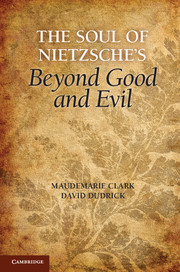Book contents
- Frontmatter
- Contents
- Note on Texts and Citations
- Introduction
- Part One The Will to Truth and the Will to Value
- 1 Setting the Stage
- 2 The “Magnificent Tension of the Spirit”
- 3 Philosophy and the Will to Value
- 4 Science and the Will to Truth
- 5 Reconciling the Will to Truth and the Will to Value
- Part Two The Will to Power
- Acknowledgments
- Bibliography
- Index
2 - The “Magnificent Tension of the Spirit”
Published online by Cambridge University Press: 05 August 2012
- Frontmatter
- Contents
- Note on Texts and Citations
- Introduction
- Part One The Will to Truth and the Will to Value
- 1 Setting the Stage
- 2 The “Magnificent Tension of the Spirit”
- 3 Philosophy and the Will to Value
- 4 Science and the Will to Truth
- 5 Reconciling the Will to Truth and the Will to Value
- Part Two The Will to Power
- Acknowledgments
- Bibliography
- Index
Summary
Turning now to BGE One, we devote the current chapter to an analysis of its first four aphorisms. We argue that these aphorisms give us the resources to understand why Nietzsche characterizes the current situation of philosophy as “a magnificent tension of the spirit.” Understanding this metaphor functions as a major key, perhaps the key, to understanding the book itself. The preface suggests that Nietzsche pins his hopes for the future of philosophy on properly relaxing the tension of the bow that constitutes contemporary philosophy. Unpacking this metaphor should allow us to understand how that tension is constituted and provide a clue to the philosophy that is the bow’s target. Because the book’s title suggests that this is a philosophy that stands “beyond good and evil,” understanding the metaphor is also likely to be crucial for understanding the book itself. Unfortunately, the preface tells us little that seems to help with the metaphor. While it lets us know that the bow is properly relaxed only by releasing its arrow, it leaves us in the dark concerning how to understand either the bow or its tension and, therefore, the philosophy that is its target. But if we recognize this and approach BGE One with questions about these matters, we will not have far to look for answers.
This is especially true if we recognize that the tension in question must involve two opposing forces. In this chapter, we argue that BGE’s first two aphorisms introduce us to two forces (drives or wills), the will to truth and the will to value, and that these are plausibly seen as the two sides of “a magnificent tension of the spirit.” BGE 3 and 4 can then plausibly be seen as an attempt to illustrate or exemplify this tension and to provide an initial indication of the future philosophy to be brought about by its proper resolution. In order to see these aphorisms in this way, however, we must engage in an esoteric reading of them. As we shall see, this esoteric reading does not differ in kind from a philosophically rigorous interpretation of the passages, though it does differ in degree because Nietzsche makes it so much harder to arrive at a philosophically rigorous interpretation of them.
- Type
- Chapter
- Information
- The Soul of Nietzsche's Beyond Good and Evil , pp. 30 - 64Publisher: Cambridge University PressPrint publication year: 2012



